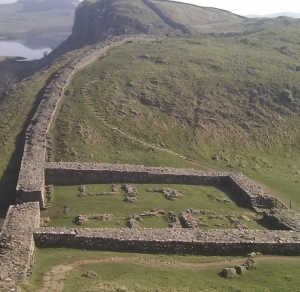The History Book Club discussion

This topic is about
Caesar
ROMAN EMPIRE -THE HISTORY...
>
CAESAR - INTRODUCTION - Spoiler Thread
date newest »
newest »
 newest »
newest »
message 1:
by
Bentley, Group Founder, Leader, Chief
(last edited Jan 28, 2018 10:19PM)
(new)
Jan 28, 2018 02:52PM
 Mod
Mod
 by
by
 Adrian Goldsworthy
Adrian Goldsworthy
reply
|
flag
Caesar: Life of a Colossus by Adrian Goldsworthy
 by
by
 Adrian Goldsworthy
Adrian Goldsworthy
Synopsis: (Event Notification)
This event notification is for the spotlighted discussion of Caesar: Life of a Colossus by Adrian Goldsworthy. Vicki will be leading the discussion. This will be a multi-thread discussion and will begin on Monday, February 26th. It will run through June 10th - 15 weeks.
Synopsis:
"In the introduction to his biography of the great Roman emperor, Adrian Goldsworthy writes, “Caesar was at times many things, including a fugitive, prisoner, rising politician, army leader, legal advocate, rebel, dictator . . . as well as husband, father, lover and adulterer.” In this landmark biography, Goldsworthy examines Caesar as military leader, in all of these roles and places his subject firmly within the context of Roman society in the first century B.C."
Awards:
The Society for Military History Distinguished Book Award (2007)
Reviews:
Monumental. . . . [Goldsworthy] writes with great style."—Atlantic Monthly
About the author:
Adrian Goldsworthy read history at Oxford and is the author of The Roman Army at War, The Punic Wars, and other books about the ancient world. He lives in Wales.
We hope that you will be able to join us for this spotlighted read.
Bentley
 by
by
 Adrian Goldsworthy
Adrian GoldsworthySynopsis: (Event Notification)
This event notification is for the spotlighted discussion of Caesar: Life of a Colossus by Adrian Goldsworthy. Vicki will be leading the discussion. This will be a multi-thread discussion and will begin on Monday, February 26th. It will run through June 10th - 15 weeks.
Synopsis:
"In the introduction to his biography of the great Roman emperor, Adrian Goldsworthy writes, “Caesar was at times many things, including a fugitive, prisoner, rising politician, army leader, legal advocate, rebel, dictator . . . as well as husband, father, lover and adulterer.” In this landmark biography, Goldsworthy examines Caesar as military leader, in all of these roles and places his subject firmly within the context of Roman society in the first century B.C."
Awards:
The Society for Military History Distinguished Book Award (2007)
Reviews:
Monumental. . . . [Goldsworthy] writes with great style."—Atlantic Monthly
About the author:
Adrian Goldsworthy read history at Oxford and is the author of The Roman Army at War, The Punic Wars, and other books about the ancient world. He lives in Wales.
We hope that you will be able to join us for this spotlighted read.
Bentley
About the Author

Adrian Goldsworthy was born in 1969. He was educated up to the age of sixteen at Westbourne House Preparatory School and Westbourne Boys College in Penarth, South Wales. He attended the Sixth Form at Stanwell Comprehensive School for his A-Levels. From there he went to St John's College, Oxford University and took a First in Ancient and Modern History. Remaining at St John's, he was awarded a D.Phil. in Literae Humaniores (Ancient History) in 1994. The topic of his thesis was 'The Roman Army as a fighting force, 100 BC-AD 200'. A modified version of this was subsequently published in the Oxford Monographs series under the title of The Roman Army at War, 100 BC - AD 200 (1996). This remains in print and is one of the best selling works in the series.
He was a Junior Research Fellow at Cardiff University for two years and subsequently taught part-time at King's College London and was an assistant professor on the University of Notre Dame's London programme for six years. He also did bits and pieces of teaching at other universities. He has lectured on a range of topics, including both Greek and (particularly) Roman History, but also taught a course on the military history of the Second World War at Notre Dame.
Teaching is tremendous fun, but writing is even more enjoyable and in the last few years he has given up teaching to write full time. Best of all this avoids the vast weight of administrative work now inevitable in any university post. It is still nice to give lectures and attend conferences, but only when time permits.
Just in case anybody is interested, he enjoys watching cricket (supporting Glamorgan in the first class game and England internationally), walking, and playing tennis - not terribly well, but with plenty of enthusiasm. He has recently started learning to ride and now wishes he had taken it up long ago.
Adrian Goldsworthy lives in South Wales.

Adrian Goldsworthy was born in 1969. He was educated up to the age of sixteen at Westbourne House Preparatory School and Westbourne Boys College in Penarth, South Wales. He attended the Sixth Form at Stanwell Comprehensive School for his A-Levels. From there he went to St John's College, Oxford University and took a First in Ancient and Modern History. Remaining at St John's, he was awarded a D.Phil. in Literae Humaniores (Ancient History) in 1994. The topic of his thesis was 'The Roman Army as a fighting force, 100 BC-AD 200'. A modified version of this was subsequently published in the Oxford Monographs series under the title of The Roman Army at War, 100 BC - AD 200 (1996). This remains in print and is one of the best selling works in the series.
He was a Junior Research Fellow at Cardiff University for two years and subsequently taught part-time at King's College London and was an assistant professor on the University of Notre Dame's London programme for six years. He also did bits and pieces of teaching at other universities. He has lectured on a range of topics, including both Greek and (particularly) Roman History, but also taught a course on the military history of the Second World War at Notre Dame.
Teaching is tremendous fun, but writing is even more enjoyable and in the last few years he has given up teaching to write full time. Best of all this avoids the vast weight of administrative work now inevitable in any university post. It is still nice to give lectures and attend conferences, but only when time permits.
Just in case anybody is interested, he enjoys watching cricket (supporting Glamorgan in the first class game and England internationally), walking, and playing tennis - not terribly well, but with plenty of enthusiasm. He has recently started learning to ride and now wishes he had taken it up long ago.
Adrian Goldsworthy lives in South Wales.
Reviews:
From Publishers Weekly
The man who virtually defined the West's concept of leadership comes alive in this splendid biography.
Military historian Goldsworthy (The Complete Roman Army) gives a comprehensive, vigorous account of Caesar's conquest of Gaul and his victories in the civil war that made him master of Rome. But he doesn't stint on the nonmartial aspects of Caesar's life—his dandyism, his flagrant womanizing (which didn't stop enemies from gay-baiting him), his supple political genius and the flair for drama and showmanship that cowed mutinous legionaries and courted Rome's restive masses.
Goldsworthy's is a sympathetic profile. In his telling, Caesar's massacres and group enslavements, though "utterly ruthless," are considered and pragmatic, not wanton, and the conqueror seems to possess a moderation and magnanimity that sprang from the same idealized self-image that fed his ambition.
The author's vivid portrait of the late Roman Republic that Caesar toppled is correspondingly jaundiced: its politics are about nothing except the personal ambitions of powerful men, and chaos, corruption and violence reign beneath the ritualistic niceties of republican procedure.
More compellingly than most biographies, Goldsworthy's exhaustive, lucid, elegantly written life makes its subject the embodiment of his age.
From Booklist
One of the most recognizable names to the ancient and modern worlds, Caesar is one of the few figures from the Roman Empire--Cicero and Augustus are two others--susceptible to modern biographical treatment.
Caesar, by Christian Meier (1996), was the previous portrait. Goldsworthy is a historian of the Roman army, a credential vital to assessing the career of Caesar, conqueror of Gaul, instigator of a fateful civil war, dictator, and would-be conqueror of Parthia (modern Iraq) but for the Ides of March.
Leaning on Caesar's Commentaries on the Gallic War, Goldsworthy exhibits strong explanatory skill about military campaigns and about Caesar's rising but precarious political status at Rome. Accepting that Caesar crossed the Rubicon to stave off personal ruination, Goldsworthy's account of the ensuing war nevertheless does not absolve his opponents, Pompey and Cato primarily, from responsibility for the political impasse behind the war. In any case, Caesar sealed his military reputation with a rapid victory. Eternally intriguing history readers, the end of the Roman Republic receives astute analysis and dramatic narration in Goldsworthy's life of Caesar. - Gilbert Taylor Copyright © American Library Association. All rights reserved --This text refers to an out of print or unavailable edition of this title.
"[An] excellent biography. . . . Goldsworthy tells this story with great skill and narrative force . . . [he] provides a great deal of vivid detail."—Mark Miller, Wall Street Journal
"An authoritative and exciting portrait not only of Caesar but of the complex society in which he lived."—Steven Coates, New York Times Book Review
"A rich and remarkably complete panorama of the times and the man. . . . The best introduction to Caesar and his world that is currently available."—Karl Galinsky, Bookforum
"This book makes and insightfully explains the leap from Caesar the soldier and general to Caesar the statesman and nation builder. It's better than any book I've ever read on him, and more incisive."—Wall Street Journal (cited by Leo J. Hindery Jr., CEO of InterMedia Partners VII LLP, as recommended reading of biographies and autobiographies of great leaders for those plotting a career path to the corner office)
"The man who virtually defined the West's concept of leadership comes alive in this splendid biography. Military historian Goldsworthy gives a comprehensive, vigorous account of Caesar's conquest of Gaul and his victories in the civil war that made him master of Rome. But he doesn't stint on the nonmartial aspects of Caesar's life—his dandyism, his flagrant womanizing (which didn't stop enemies from gay-baiting him), his supple political genius and the flair for drama and showmanship that cowed mutinous legionaries and courted Rome's restive masses. Goldsworthy's is a sympathetic profile. . . . More compellingly than most biographies, Goldsworthy's exhaustive, lucid, elegantly written life makes its subject the embodiment of his age."—Publishers Weekly (starred review)
"This is an engaging and well-drawn resource for those who wish to be introduced to the man who was Caesar. . . . Additions to Goldsworthy's text include a chronology of key events, a glossary, and notes. Recommended for academic and larger public libraries."—Library Journal
"Adrian Goldsworthy's new biography, Caesar: Life of a Colossus, succeeds in capturing all the drama and complexity of this best-known of lives. Mr. Goldsworthy, a prolific young British classicist, has real narrative gifts, as well as an encyclopedic knowledge of late republican Rome. Together, these strengths make Caesar one of the most fascinating biographies you will come across this year."—Adam Kirsch, New York Sun
"Eternally intriguing history readers, the end of the Roman Republic receives astute analysis and dramatic narration in Goldsworthy's life of Caesar."—Booklist
"Lively and accessible."—Mike Oppenheim, Journal ofMilitary History
"[Goldsworthy] succeeds in returning the man to his time and place and reminds us how it all could have been very different."—Blake D. Dvorak, Washington Times
"Monumental. . . . [Goldsworthy] writes with great style."—Atlantic Monthly
"Excellent and very readable. . . . Designed for the general reader or a lover of history and [it is a] reading experience of the first order."—David Walton, Milwaukee Journal Sentinel
"Caesar: Life of a Colossus . . .is a superb and absorbing life of the man who came, saw and conquered—and then was murdered for his trouble."—J. Peder Zane, News and Observer
"Noteworthy. . . . Goldsworthy gives a thorough account of Caesar’s military accomplishments as well as painting a vivid portrait of both the man and the power-hungry world he inhabited."—Christian Science Monitor
"Goldsworthy’s deep knowledge of Caesar’s times makes it possible to fill in all sorts of details on education, military affairs, marriage customs, but most of all on the ferocious politics of Caesar’s time. . . . [A] fine biography which brings, in prose which is never pedantic or dull, depth, color and context to his amazing life and interesting times."—John Lisenmeyer, Greenwich Times
"It gives me great pleasure to give Caesar the strongest possible recommendation. Caesar was a complex character living in confusing times, but Adrian Goldsworthy tackles the subject with a vigor, thoroughness and clarity of purpose that the great man himself would have approved of."—Philip Sidnell, Editor, Ancient and Medieval History Book Club (London)
"Goldsworthy's book will remain the definitive biography of Caesar for years to come."—Philip Matyszak, author of The Sons of Caesar: Imperial Rome's First Dynasty
"Adrian Goldsworthy is one of our most promising young military historians today."—Sir John Keegan, author of The Iraq War
"Adrian Goldsworthy is one of the new generation of young classicists who combine scholarship with storytelling to bring the ancient world to life. In his masterly new Caesar, he shows us the greatest Roman as man, statesman, soldier, and lover."—Simon Sebag Montefiore, author of Stalin: The Court of the Red Tsar
"Caesar is an accessible, balanced, and highly readable contribution to our understanding of one of Rome's most complex characters. No one writing in English today knows more about Roman military history than Adrian Goldsworthy."—Guy MacLean Rogers, author of Alexander: The Ambiguity of Greatness
From Publishers Weekly
The man who virtually defined the West's concept of leadership comes alive in this splendid biography.
Military historian Goldsworthy (The Complete Roman Army) gives a comprehensive, vigorous account of Caesar's conquest of Gaul and his victories in the civil war that made him master of Rome. But he doesn't stint on the nonmartial aspects of Caesar's life—his dandyism, his flagrant womanizing (which didn't stop enemies from gay-baiting him), his supple political genius and the flair for drama and showmanship that cowed mutinous legionaries and courted Rome's restive masses.
Goldsworthy's is a sympathetic profile. In his telling, Caesar's massacres and group enslavements, though "utterly ruthless," are considered and pragmatic, not wanton, and the conqueror seems to possess a moderation and magnanimity that sprang from the same idealized self-image that fed his ambition.
The author's vivid portrait of the late Roman Republic that Caesar toppled is correspondingly jaundiced: its politics are about nothing except the personal ambitions of powerful men, and chaos, corruption and violence reign beneath the ritualistic niceties of republican procedure.
More compellingly than most biographies, Goldsworthy's exhaustive, lucid, elegantly written life makes its subject the embodiment of his age.
From Booklist
One of the most recognizable names to the ancient and modern worlds, Caesar is one of the few figures from the Roman Empire--Cicero and Augustus are two others--susceptible to modern biographical treatment.
Caesar, by Christian Meier (1996), was the previous portrait. Goldsworthy is a historian of the Roman army, a credential vital to assessing the career of Caesar, conqueror of Gaul, instigator of a fateful civil war, dictator, and would-be conqueror of Parthia (modern Iraq) but for the Ides of March.
Leaning on Caesar's Commentaries on the Gallic War, Goldsworthy exhibits strong explanatory skill about military campaigns and about Caesar's rising but precarious political status at Rome. Accepting that Caesar crossed the Rubicon to stave off personal ruination, Goldsworthy's account of the ensuing war nevertheless does not absolve his opponents, Pompey and Cato primarily, from responsibility for the political impasse behind the war. In any case, Caesar sealed his military reputation with a rapid victory. Eternally intriguing history readers, the end of the Roman Republic receives astute analysis and dramatic narration in Goldsworthy's life of Caesar. - Gilbert Taylor Copyright © American Library Association. All rights reserved --This text refers to an out of print or unavailable edition of this title.
"[An] excellent biography. . . . Goldsworthy tells this story with great skill and narrative force . . . [he] provides a great deal of vivid detail."—Mark Miller, Wall Street Journal
"An authoritative and exciting portrait not only of Caesar but of the complex society in which he lived."—Steven Coates, New York Times Book Review
"A rich and remarkably complete panorama of the times and the man. . . . The best introduction to Caesar and his world that is currently available."—Karl Galinsky, Bookforum
"This book makes and insightfully explains the leap from Caesar the soldier and general to Caesar the statesman and nation builder. It's better than any book I've ever read on him, and more incisive."—Wall Street Journal (cited by Leo J. Hindery Jr., CEO of InterMedia Partners VII LLP, as recommended reading of biographies and autobiographies of great leaders for those plotting a career path to the corner office)
"The man who virtually defined the West's concept of leadership comes alive in this splendid biography. Military historian Goldsworthy gives a comprehensive, vigorous account of Caesar's conquest of Gaul and his victories in the civil war that made him master of Rome. But he doesn't stint on the nonmartial aspects of Caesar's life—his dandyism, his flagrant womanizing (which didn't stop enemies from gay-baiting him), his supple political genius and the flair for drama and showmanship that cowed mutinous legionaries and courted Rome's restive masses. Goldsworthy's is a sympathetic profile. . . . More compellingly than most biographies, Goldsworthy's exhaustive, lucid, elegantly written life makes its subject the embodiment of his age."—Publishers Weekly (starred review)
"This is an engaging and well-drawn resource for those who wish to be introduced to the man who was Caesar. . . . Additions to Goldsworthy's text include a chronology of key events, a glossary, and notes. Recommended for academic and larger public libraries."—Library Journal
"Adrian Goldsworthy's new biography, Caesar: Life of a Colossus, succeeds in capturing all the drama and complexity of this best-known of lives. Mr. Goldsworthy, a prolific young British classicist, has real narrative gifts, as well as an encyclopedic knowledge of late republican Rome. Together, these strengths make Caesar one of the most fascinating biographies you will come across this year."—Adam Kirsch, New York Sun
"Eternally intriguing history readers, the end of the Roman Republic receives astute analysis and dramatic narration in Goldsworthy's life of Caesar."—Booklist
"Lively and accessible."—Mike Oppenheim, Journal ofMilitary History
"[Goldsworthy] succeeds in returning the man to his time and place and reminds us how it all could have been very different."—Blake D. Dvorak, Washington Times
"Monumental. . . . [Goldsworthy] writes with great style."—Atlantic Monthly
"Excellent and very readable. . . . Designed for the general reader or a lover of history and [it is a] reading experience of the first order."—David Walton, Milwaukee Journal Sentinel
"Caesar: Life of a Colossus . . .is a superb and absorbing life of the man who came, saw and conquered—and then was murdered for his trouble."—J. Peder Zane, News and Observer
"Noteworthy. . . . Goldsworthy gives a thorough account of Caesar’s military accomplishments as well as painting a vivid portrait of both the man and the power-hungry world he inhabited."—Christian Science Monitor
"Goldsworthy’s deep knowledge of Caesar’s times makes it possible to fill in all sorts of details on education, military affairs, marriage customs, but most of all on the ferocious politics of Caesar’s time. . . . [A] fine biography which brings, in prose which is never pedantic or dull, depth, color and context to his amazing life and interesting times."—John Lisenmeyer, Greenwich Times
"It gives me great pleasure to give Caesar the strongest possible recommendation. Caesar was a complex character living in confusing times, but Adrian Goldsworthy tackles the subject with a vigor, thoroughness and clarity of purpose that the great man himself would have approved of."—Philip Sidnell, Editor, Ancient and Medieval History Book Club (London)
"Goldsworthy's book will remain the definitive biography of Caesar for years to come."—Philip Matyszak, author of The Sons of Caesar: Imperial Rome's First Dynasty
"Adrian Goldsworthy is one of our most promising young military historians today."—Sir John Keegan, author of The Iraq War
"Adrian Goldsworthy is one of the new generation of young classicists who combine scholarship with storytelling to bring the ancient world to life. In his masterly new Caesar, he shows us the greatest Roman as man, statesman, soldier, and lover."—Simon Sebag Montefiore, author of Stalin: The Court of the Red Tsar
"Caesar is an accessible, balanced, and highly readable contribution to our understanding of one of Rome's most complex characters. No one writing in English today knows more about Roman military history than Adrian Goldsworthy."—Guy MacLean Rogers, author of Alexander: The Ambiguity of Greatness
From the Author
A conversation with Adrian Goldsworthy
Q: What is new about your book?
A: The overall approach is new. As far as possible I have tried to write this as if it were the biography of a twentieth-century statesman, looking in as much detail as possible at every aspect of his life. One of the biggest differences with Meier—and also Gelzer, who wrote the most important biography of Caesar before Meier—is that I have tried to cover each stage of his life in equal detail. Their focus was always on the politics. Yet Caesar spent a very large part of his life at war—he was on campaign for no less than thirteen of the last fifteen years of his life. We need to understand Caesar the soldier as much as Caesar the politician because the two were so closely intertwined.
Q: What are the parallels between Ancient Rome and our own times?
A: It would be wrong to claim exact parallels between Rome in the first century B.C. and the modern world, but there are undeniable lessons to be learnt from the turbulent history of these years. One of the most important is to show the fragility of political systems. Caesar lived in the last decades of the Roman Republic, a system which was already three centuries old at the time of his birth. But less than twenty years after his death, his adopted son Octavian had turned Rome into what was a monarchy in all but name. There is perhaps a lesson for modern democracies in the danger of allowing entrenched lobby groups, political parties, and other interests to stifle real debate.
Q: Where was Caesar headed at the time of his assassination?
A: Caesar was about to set out on a series of campaigns against the Dathians and Parcians, in what is modern Iraq.
A conversation with Adrian Goldsworthy
Q: What is new about your book?
A: The overall approach is new. As far as possible I have tried to write this as if it were the biography of a twentieth-century statesman, looking in as much detail as possible at every aspect of his life. One of the biggest differences with Meier—and also Gelzer, who wrote the most important biography of Caesar before Meier—is that I have tried to cover each stage of his life in equal detail. Their focus was always on the politics. Yet Caesar spent a very large part of his life at war—he was on campaign for no less than thirteen of the last fifteen years of his life. We need to understand Caesar the soldier as much as Caesar the politician because the two were so closely intertwined.
Q: What are the parallels between Ancient Rome and our own times?
A: It would be wrong to claim exact parallels between Rome in the first century B.C. and the modern world, but there are undeniable lessons to be learnt from the turbulent history of these years. One of the most important is to show the fragility of political systems. Caesar lived in the last decades of the Roman Republic, a system which was already three centuries old at the time of his birth. But less than twenty years after his death, his adopted son Octavian had turned Rome into what was a monarchy in all but name. There is perhaps a lesson for modern democracies in the danger of allowing entrenched lobby groups, political parties, and other interests to stifle real debate.
Q: Where was Caesar headed at the time of his assassination?
A: Caesar was about to set out on a series of campaigns against the Dathians and Parcians, in what is modern Iraq.
Amazon Biography:

Biography:
Adrian Goldsworthy was born in 1969 in Cardiff. He was educated in Penarth and then read Ancient and Modern History at St. John's College, Oxford, where he subsequently completed his doctorate in ancient history. His D.Phil. Thesis was the basis for his first book, The Roman Army At War 100 BC - AD 200, which looked at how the Roman army actually operated on campaign and in battle.
For several years he taught in a number of universities, and began to write for a wider audience. A succession of books followed dealing with aspects of ancient military history, including Roman Warfare, The Punic Wars (which was later re-issued as the Fall of Carthage), Cannae, In the Name of Rome and the Complete Roman Army. More recently he has looked at wider themes, combining the military focus with discussion of politics and society in a biography of Caesar, and a study of the decline and fall of the Roman Empire, titled How Rome Fell (although released in the UK as The Fall of the West). His latest book is a paired biography of Antony and Cleopatra.
He is now a full time writer, and no longer teaches, although he is currently a Visiting Fellow at the University of Newcastle. However, he frequently gives one off lectures and talks both to universities and other groups in the UK, USA, Canada, and Europe. In the last couple of years audiences have included local history societies, graduates and undergraduates in a range of countries, the cadets of VMI, and the distinguished cast of a new production of Shakespeare's Antony and Cleopatra. He frequently appears as a talking head or presenter in TV documentaries and has acted as consultant on both documentaries and dramas. He will appear in six of the eight episodes of the forthcoming When Rome ruled series for National Geographic. He often appears on radio.

Biography:
Adrian Goldsworthy was born in 1969 in Cardiff. He was educated in Penarth and then read Ancient and Modern History at St. John's College, Oxford, where he subsequently completed his doctorate in ancient history. His D.Phil. Thesis was the basis for his first book, The Roman Army At War 100 BC - AD 200, which looked at how the Roman army actually operated on campaign and in battle.
For several years he taught in a number of universities, and began to write for a wider audience. A succession of books followed dealing with aspects of ancient military history, including Roman Warfare, The Punic Wars (which was later re-issued as the Fall of Carthage), Cannae, In the Name of Rome and the Complete Roman Army. More recently he has looked at wider themes, combining the military focus with discussion of politics and society in a biography of Caesar, and a study of the decline and fall of the Roman Empire, titled How Rome Fell (although released in the UK as The Fall of the West). His latest book is a paired biography of Antony and Cleopatra.
He is now a full time writer, and no longer teaches, although he is currently a Visiting Fellow at the University of Newcastle. However, he frequently gives one off lectures and talks both to universities and other groups in the UK, USA, Canada, and Europe. In the last couple of years audiences have included local history societies, graduates and undergraduates in a range of countries, the cadets of VMI, and the distinguished cast of a new production of Shakespeare's Antony and Cleopatra. He frequently appears as a talking head or presenter in TV documentaries and has acted as consultant on both documentaries and dramas. He will appear in six of the eight episodes of the forthcoming When Rome ruled series for National Geographic. He often appears on radio.
Adrian's Blog on his website:
Adrian's blog
2017-11-26
Vindolanda out in paperback
Vindolanda is now on sale in paperback. Included this time is a map of Northern Britain in the period which somehow got missed out of the hardback. Also a short sample of the sequel, The Encircling Sea due for release at the end of May 2018
2017-06-01
Vindolanda on sale now
The first novel in my Roman series, Vindolanda is released today.
There is already a fair bit of supporting material on the website. More to follow soon.
2016-12-21
Twenty years on
My first book, The Roman army at war, 100 BC to AD 200 is now twenty years old. It was based on my doctoral thesis, tidied up and with a few extra bits added because it was no longer limited to the thesis word count of 100,000. If memory serves the first print run was just 300 copies, but later there were some fifteen hundred hardbacks published and the still available paperback edition has sold well over nine thousand copies. That's small fry by commercial standards, but not bad for a book aimed primarily at other academics.
Few writers can resist tinkering with their work if they are given a chance, and I'm sure that if I wrote the book now that the style would be different and it would certainly be longer. When I started my doctorate I had wanted to look at sieges as well as open battle, but there simply was not room to do it properly. After two more decades of studying and thinking about the Roman army and ancient warfare, I still do not think that I would change any of the main arguments - and very few of the minor details. There probably ought to have been more discussion of the debate over S.L.A. Marshall's ideas about natural fighters and low participation in fire-fights in the Second World War and Korea by US soldiers and those of other armies. It's a complicated field, and maybe someday I'll write again about these issues in detail, but I still believe that whatever you think of Marshall and some of his claims, that it is true that in battle most of the effective fighting is done by a minority, whether we are talking about the age of Homer or the modern day.
Not everyone agrees with my interpretation of how the Roman army functioned on campaign and how battles were fought. So far I have not been convinced to change my mind by anyone who has challenged my views, but a fair few have come up with ideas that to my fit very well in the same broader picture. Sadly studying warfare remains deeply unfashionable among scholars working on the Roman world. That does not show any sign of changing in the near future.
2016-11-07
Problems with e-mail
Some people have had problems clicking the link to e-mail me. It should work now, but in case it doesn't simply copy the e-mail address on the contact page.
2016-08-11
Pax Romana released today in the UK
This is the official release date for the UK edition of PAX ROMANA. I was up in London today and signed a stack of books at Hatchards in Piccadilly, so that is the place if you want to get a signed copy.
There is a new page on the website about the book. The US release from Yale University Press comes at the start of next month.
By the way - yes, I do know that the photograph of Masada is back to front. It will be changed in the next print and for the paperback.






















 all by
all by
 Adrian Goldsworthy
Adrian Goldsworthy
Adrian's blog
2017-11-26
Vindolanda out in paperback
Vindolanda is now on sale in paperback. Included this time is a map of Northern Britain in the period which somehow got missed out of the hardback. Also a short sample of the sequel, The Encircling Sea due for release at the end of May 2018
2017-06-01
Vindolanda on sale now
The first novel in my Roman series, Vindolanda is released today.
There is already a fair bit of supporting material on the website. More to follow soon.
2016-12-21
Twenty years on
My first book, The Roman army at war, 100 BC to AD 200 is now twenty years old. It was based on my doctoral thesis, tidied up and with a few extra bits added because it was no longer limited to the thesis word count of 100,000. If memory serves the first print run was just 300 copies, but later there were some fifteen hundred hardbacks published and the still available paperback edition has sold well over nine thousand copies. That's small fry by commercial standards, but not bad for a book aimed primarily at other academics.
Few writers can resist tinkering with their work if they are given a chance, and I'm sure that if I wrote the book now that the style would be different and it would certainly be longer. When I started my doctorate I had wanted to look at sieges as well as open battle, but there simply was not room to do it properly. After two more decades of studying and thinking about the Roman army and ancient warfare, I still do not think that I would change any of the main arguments - and very few of the minor details. There probably ought to have been more discussion of the debate over S.L.A. Marshall's ideas about natural fighters and low participation in fire-fights in the Second World War and Korea by US soldiers and those of other armies. It's a complicated field, and maybe someday I'll write again about these issues in detail, but I still believe that whatever you think of Marshall and some of his claims, that it is true that in battle most of the effective fighting is done by a minority, whether we are talking about the age of Homer or the modern day.
Not everyone agrees with my interpretation of how the Roman army functioned on campaign and how battles were fought. So far I have not been convinced to change my mind by anyone who has challenged my views, but a fair few have come up with ideas that to my fit very well in the same broader picture. Sadly studying warfare remains deeply unfashionable among scholars working on the Roman world. That does not show any sign of changing in the near future.
2016-11-07
Problems with e-mail
Some people have had problems clicking the link to e-mail me. It should work now, but in case it doesn't simply copy the e-mail address on the contact page.
2016-08-11
Pax Romana released today in the UK
This is the official release date for the UK edition of PAX ROMANA. I was up in London today and signed a stack of books at Hatchards in Piccadilly, so that is the place if you want to get a signed copy.
There is a new page on the website about the book. The US release from Yale University Press comes at the start of next month.
By the way - yes, I do know that the photograph of Masada is back to front. It will be changed in the next print and for the paperback.






















 all by
all by
 Adrian Goldsworthy
Adrian Goldsworthy
Adrian's Recommendations on Useful Links: - on his website
Useful links
Ancient History and Archaeology
I am currently a Visiting Fellow in the archaeology department at Newcastle University. Placed as it is at the eastern end of Hadrian's Wall, this is a great place to study ancient history and/or archaeology, so I thought that I would post a couple of links to some of the postgraduate courses they offer:-
First in Greek and Roman archaeology - http://www.ncl.ac.uk/postgraduate/cou...
Here is another to one on Roman Frontier Studies, something not offered in many places - http://www.ncl.ac.uk/postgraduate/cou...
Philip Matyszak, who writes on a wide range of themes from Greek and Roman history, varying from biographies, studies of campaigns and themes, to the lighter time travellers' guides to ancient Rome and Athens, or the 'Unofficial' textbooks on being a legionary or a gladiator. Some of the latter are terrific gifts for friends you want to introduce to the classical world as they are easy to read, often funny, but filled with detailed information.
http://www.matyszakbooks.com/index.html
Ian Hughes, who has written books on Belisarius, Stilicho and Aetius, and has another coming out that covers Valentinian and Valens. All take a fresh look not just at the military side of things, but at the political and social contexts of these campaigns.
http://www.ianhughesma.com/
Dorothy King, who runs a lively blog which deals with a lot of current news and on-going debates in archaeology - and also quite a lot of other topics.
http://phdiva.blogspot.co.uk/
Napoleonic
Carole Divall, who has written a series of books, some dealing in detail with the 30th Regiment, another on researching the lives of individuals in the British army of this era, and most recently a history of the siege of Burgos and the retreat to Portugal in late 1812.
http://www.caroledivall.co.uk/
Gareth Glover, who works tirelessly to discover, edit, and put into print records and especially personal accounts of the period. All have something new in them, while his series The Waterloo archive currently running to four volumes is jam-packed with surprises even for anyone who has read a lot about the campaign.
http://www.garethglovercollection.com/
Other periods
Ian Knight, who will already be well known to anyone with an interest in the colonial campaigns of the late nineteenth century and especially the Zulu War of 1879. Once again, he is someone able to find fresh insights in a period thought to be well known. His book, Zulu Rising, is the best account of the causes of the Zulu war and the Isandlwana and Rorke's Drift campaign, and in his other works you will find a lot about the rest of the conflict. For ancient historians, the Victorian era often provides interesting parallels for the Roman frontier experience.
http://www.ianknightzulu.com/
Finally, I have already put this in a blog entry, but there is a lot of good advice on this site for those thinking of having a go at writing historical fiction.
http://writinghistoricalnovels.com/
Useful links
Ancient History and Archaeology
I am currently a Visiting Fellow in the archaeology department at Newcastle University. Placed as it is at the eastern end of Hadrian's Wall, this is a great place to study ancient history and/or archaeology, so I thought that I would post a couple of links to some of the postgraduate courses they offer:-
First in Greek and Roman archaeology - http://www.ncl.ac.uk/postgraduate/cou...
Here is another to one on Roman Frontier Studies, something not offered in many places - http://www.ncl.ac.uk/postgraduate/cou...
Philip Matyszak, who writes on a wide range of themes from Greek and Roman history, varying from biographies, studies of campaigns and themes, to the lighter time travellers' guides to ancient Rome and Athens, or the 'Unofficial' textbooks on being a legionary or a gladiator. Some of the latter are terrific gifts for friends you want to introduce to the classical world as they are easy to read, often funny, but filled with detailed information.
http://www.matyszakbooks.com/index.html
Ian Hughes, who has written books on Belisarius, Stilicho and Aetius, and has another coming out that covers Valentinian and Valens. All take a fresh look not just at the military side of things, but at the political and social contexts of these campaigns.
http://www.ianhughesma.com/
Dorothy King, who runs a lively blog which deals with a lot of current news and on-going debates in archaeology - and also quite a lot of other topics.
http://phdiva.blogspot.co.uk/
Napoleonic
Carole Divall, who has written a series of books, some dealing in detail with the 30th Regiment, another on researching the lives of individuals in the British army of this era, and most recently a history of the siege of Burgos and the retreat to Portugal in late 1812.
http://www.caroledivall.co.uk/
Gareth Glover, who works tirelessly to discover, edit, and put into print records and especially personal accounts of the period. All have something new in them, while his series The Waterloo archive currently running to four volumes is jam-packed with surprises even for anyone who has read a lot about the campaign.
http://www.garethglovercollection.com/
Other periods
Ian Knight, who will already be well known to anyone with an interest in the colonial campaigns of the late nineteenth century and especially the Zulu War of 1879. Once again, he is someone able to find fresh insights in a period thought to be well known. His book, Zulu Rising, is the best account of the causes of the Zulu war and the Isandlwana and Rorke's Drift campaign, and in his other works you will find a lot about the rest of the conflict. For ancient historians, the Victorian era often provides interesting parallels for the Roman frontier experience.
http://www.ianknightzulu.com/
Finally, I have already put this in a blog entry, but there is a lot of good advice on this site for those thinking of having a go at writing historical fiction.
http://writinghistoricalnovels.com/
TV and Media appearances

Over the last few years Adrian has appeared in many documentaries produced for the BBC, Discovery Channel, History Channel, and National Geographic, on various aspects of ancient history (some of these are shown in more detail below). He took part in a discussion on great leaders for Swedish television. A lecture he gave at the University of Virginia's bookstore was broadcast in the USA on C-SPAN's Book TV.
In 2008 Adrian appeared as expert witness on BBC Radio 4's Great Lives programme in an episode about Julius Caesar. He has also been interviewed for radio programmes in the UK, USA, Canada, Spain, and Portugal. Many of these have been live.

Over the last few years Adrian has appeared in many documentaries produced for the BBC, Discovery Channel, History Channel, and National Geographic, on various aspects of ancient history (some of these are shown in more detail below). He took part in a discussion on great leaders for Swedish television. A lecture he gave at the University of Virginia's bookstore was broadcast in the USA on C-SPAN's Book TV.
In 2008 Adrian appeared as expert witness on BBC Radio 4's Great Lives programme in an episode about Julius Caesar. He has also been interviewed for radio programmes in the UK, USA, Canada, Spain, and Portugal. Many of these have been live.
On Adrian's website:
TIME COMMANDERS
He was the Historical Consultant on both series of the BBC's TIME COMMANDERS shown from 2003 to 2005 and presented first by Eddie Mair and then Richard Hammond and produced by LION TV.
In each show a team of four members of the public took charge of one side in a grand computer simulation of an ancient battle. Adrian worked with the production team and the computer experts from Creative Assembly before, during and after filming. He also appeared as one of the two on-screen experts in five episodes - Cannae, Adrianople, Cynoscephalae, Sarmizegethusa, and Troy.
Link to youtube videos of a three part edited version of the Cannae episode, featuring Adrian with a truly bizarre hairstyle:
http://uk.youtube.com/watch?v=E4jAy_0...
http://uk.youtube.com/watch?v=u9tXUr4...
http://uk.youtube.com/watch
TIME COMMANDERS
He was the Historical Consultant on both series of the BBC's TIME COMMANDERS shown from 2003 to 2005 and presented first by Eddie Mair and then Richard Hammond and produced by LION TV.
In each show a team of four members of the public took charge of one side in a grand computer simulation of an ancient battle. Adrian worked with the production team and the computer experts from Creative Assembly before, during and after filming. He also appeared as one of the two on-screen experts in five episodes - Cannae, Adrianople, Cynoscephalae, Sarmizegethusa, and Troy.
Link to youtube videos of a three part edited version of the Cannae episode, featuring Adrian with a truly bizarre hairstyle:
http://uk.youtube.com/watch?v=E4jAy_0...
http://uk.youtube.com/watch?v=u9tXUr4...
http://uk.youtube.com/watch
HANNIBAL: ROME'S WORST NIGHTMARE
Again from Adrian's website:
He was also Historical consultant for the BBC drama, HANNIBAL: ROME'S WORST NIGHTMARE starring Alexander Siddig as Hannibal, and directed by Ed Bazalgette, and produced by Ailsa Orr. He also appeared in the accompanying documentary.
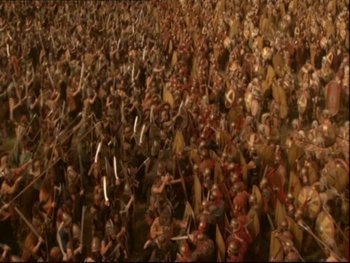
Adrian's comment: 'Again a terrific team of people and a great pleasure to be involved in this project. It was fascinating to see the script evolve and then see the final film. Hannibal is a huge subject and it was interesting to see how visual story-telling works in slightly different way to a book.'
Again from Adrian's website:
He was also Historical consultant for the BBC drama, HANNIBAL: ROME'S WORST NIGHTMARE starring Alexander Siddig as Hannibal, and directed by Ed Bazalgette, and produced by Ailsa Orr. He also appeared in the accompanying documentary.

Adrian's comment: 'Again a terrific team of people and a great pleasure to be involved in this project. It was fascinating to see the script evolve and then see the final film. Hannibal is a huge subject and it was interesting to see how visual story-telling works in slightly different way to a book.'
HANNIBAL (another from Adrian's website)

Adrian was consultant and talking head in Atlantic Television's drama-documentary HANNIBAL directed by Richard Bedser and produced by Charlotte Wheaton and shown in the UK as part of Channel Five's Revealed Series.
Adrian's comment: 'Another terrific project with some really talented and gifted people. The main memory is going to the premiere and seeing my own face on an eighteen foot high cinema screen. It is not an experience I recommend for the nervous!'

Adrian was consultant and talking head in Atlantic Television's drama-documentary HANNIBAL directed by Richard Bedser and produced by Charlotte Wheaton and shown in the UK as part of Channel Five's Revealed Series.
Adrian's comment: 'Another terrific project with some really talented and gifted people. The main memory is going to the premiere and seeing my own face on an eighteen foot high cinema screen. It is not an experience I recommend for the nervous!'
ROME (again another excerpt from Adrian's website)
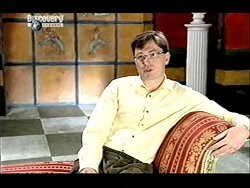
In 2008 Adrian filmed brief introductions and answered viewers' questions for Discovery Channel UK's broadcast of the HBO drama Rome. Some of these can be seen on the channel's website:-
Adrian's comment: 'I don't know whether I have simply been lucky, but once again the crew who shot these were a really nice and professional bunch. (They even managed to persuade me to wear some fairly brightly coloured shirts, which is no mean feat). The hardest bit was doing the short sequences for the commercial breaks, as these could not be edited so had to be right. The second hardest bit was not leaning against the very realistic looking columns on the set.'

In 2008 Adrian filmed brief introductions and answered viewers' questions for Discovery Channel UK's broadcast of the HBO drama Rome. Some of these can be seen on the channel's website:-
Adrian's comment: 'I don't know whether I have simply been lucky, but once again the crew who shot these were a really nice and professional bunch. (They even managed to persuade me to wear some fairly brightly coloured shirts, which is no mean feat). The hardest bit was doing the short sequences for the commercial breaks, as these could not be edited so had to be right. The second hardest bit was not leaning against the very realistic looking columns on the set.'
TIME TEAM LIVE (again from Adrian's web site)
He also appeared on Channel Four's TIME TEAM LIVE when they did a day concentrating on the army in Roman Britain.
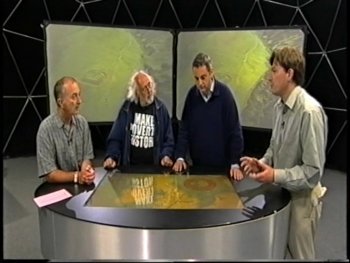
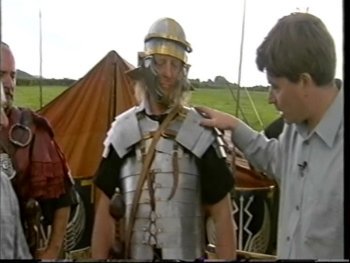
Adrian comments: 'It was great to be involved even in a small way with a programme that has done so much to promote archaeology and interest in the past. They are a slick, well practised team, and everyone seemed exactly as they come across on screen.'
He also appeared on Channel Four's TIME TEAM LIVE when they did a day concentrating on the army in Roman Britain.


Adrian comments: 'It was great to be involved even in a small way with a programme that has done so much to promote archaeology and interest in the past. They are a slick, well practised team, and everyone seemed exactly as they come across on screen.'
WBUR Radio - (again on Adrian's website)
In 2006 Adrian was interviewed about Julius Caesar by Tom Ashbrook for his ON POINT show for WBUR Radio in Boston. You can listen to the hour long programme by following this link and clicking on the button marked Listen to this show.
You can listen to the program here on this link:
http://onpoint.legacy.wbur.org/2006/0...
In 2006 Adrian was interviewed about Julius Caesar by Tom Ashbrook for his ON POINT show for WBUR Radio in Boston. You can listen to the hour long programme by following this link and clicking on the button marked Listen to this show.
You can listen to the program here on this link:
http://onpoint.legacy.wbur.org/2006/0...
When Rome Ruled (again from Adrian's website)
Adrian is currently appeared as one of the presenters in the National Geographic Series When Rome Ruled. He filmed on location in Italy, France, and Britain, and features in the episodes, Killing Caesar, The Rise of Christianity, Secrets of the Gladiators, The Real Caligula, The War Machine, Ancient Superpower.
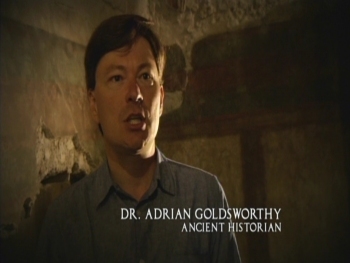

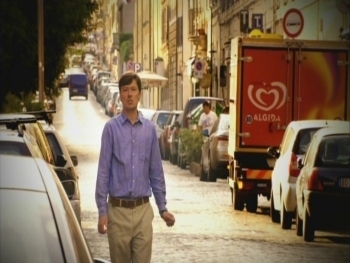
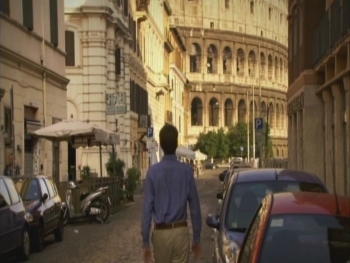

Adrian is currently appeared as one of the presenters in the National Geographic Series When Rome Ruled. He filmed on location in Italy, France, and Britain, and features in the episodes, Killing Caesar, The Rise of Christianity, Secrets of the Gladiators, The Real Caligula, The War Machine, Ancient Superpower.





Appearances (again from Adrian's website)

Adrian Goldsworthy frequently lectures at universities, conferences, book fairs, and to societies. In recent years these have included:
The Hay on Wye Literary Festival
The Göteborg Book Fair, Sweden
Warwick University,
Hadrianic Society's Roman Army School at St. Aidan's College, Durham University
University of Florida
University of Virginia
The Virginia Military Institute
Hillsdale College, Michigan
Berkeley College, Yale University
Ottawa University
Carelton University
Göteborg University
Lisbon University
UNED and San Pablo CEU in Madrid
University of Leiden
Peterhouse College, Cambridge
St. John's College, Oxford
Appearances in 2018:
24th and 26th January - Rancho Mirage Writers Festival, California
25th January - Azura Pacific University, California
4th April - 2.30pm, All Saints Church, Penarth - Hadrian's Wall: Rome's North West Frontier in Fact and fiction - https://griffinbooks.co.uk/index.php/...
13th March - 2.15pm, Words by the Water, Theatre by the Lake, Keswick, Cumbria - Hadrian's Wall https://www.theatrebythelake.com/Imag...

Adrian Goldsworthy frequently lectures at universities, conferences, book fairs, and to societies. In recent years these have included:
The Hay on Wye Literary Festival
The Göteborg Book Fair, Sweden
Warwick University,
Hadrianic Society's Roman Army School at St. Aidan's College, Durham University
University of Florida
University of Virginia
The Virginia Military Institute
Hillsdale College, Michigan
Berkeley College, Yale University
Ottawa University
Carelton University
Göteborg University
Lisbon University
UNED and San Pablo CEU in Madrid
University of Leiden
Peterhouse College, Cambridge
St. John's College, Oxford
Appearances in 2018:
24th and 26th January - Rancho Mirage Writers Festival, California
25th January - Azura Pacific University, California
4th April - 2.30pm, All Saints Church, Penarth - Hadrian's Wall: Rome's North West Frontier in Fact and fiction - https://griffinbooks.co.uk/index.php/...
13th March - 2.15pm, Words by the Water, Theatre by the Lake, Keswick, Cumbria - Hadrian's Wall https://www.theatrebythelake.com/Imag...
Other work (again from Adrian's website)
Adrian Goldsworthy has contributed articles and reviews to a range of newspapers and journals including the Independent newspaper and Spectator magazine in Britain, and the Washington Post and LA Times in the US. He has written for and is a contributing editor of Military History Quarterly.
'He contributed a chapter to the Makers of Ancient Strategy published by Princeton University Press and edited by Victor Davis-Hanson'.
He also contributed four entries to The Great Commanders published by Quercus and edited by Andrew Roberts.
In the past he wrote entries for the Oxford Companion to Military History edited by Richard Holmes and the Hutchinson Dictionary of Ancient and Medieval Warfare.
His academic publications include:
With I. P. Haynes as co-editor, The Roman Army as a Community in Peace and War. Journal of Roman Archaeology Supplementary Series 34 (1999).
The Othismos, Myths and Heresies: The nature of hoplite battle", War in History 4. 1 (1997), pp. 1-25.
"'Instinctive Genius'. The depiction of Caesar as a general in the Commentarii", in K. Welch & A. Powell (edd.), Julius Caesar as Artful Reporter. The Commentarii as Political Propaganda, (Swansea, 1998), 193-219.
There are also a number of reviews and smaller pieces and a couple of articles under way.
Adrian Goldsworthy has contributed articles and reviews to a range of newspapers and journals including the Independent newspaper and Spectator magazine in Britain, and the Washington Post and LA Times in the US. He has written for and is a contributing editor of Military History Quarterly.
'He contributed a chapter to the Makers of Ancient Strategy published by Princeton University Press and edited by Victor Davis-Hanson'.
He also contributed four entries to The Great Commanders published by Quercus and edited by Andrew Roberts.
In the past he wrote entries for the Oxford Companion to Military History edited by Richard Holmes and the Hutchinson Dictionary of Ancient and Medieval Warfare.
His academic publications include:
With I. P. Haynes as co-editor, The Roman Army as a Community in Peace and War. Journal of Roman Archaeology Supplementary Series 34 (1999).
The Othismos, Myths and Heresies: The nature of hoplite battle", War in History 4. 1 (1997), pp. 1-25.
"'Instinctive Genius'. The depiction of Caesar as a general in the Commentarii", in K. Welch & A. Powell (edd.), Julius Caesar as Artful Reporter. The Commentarii as Political Propaganda, (Swansea, 1998), 193-219.
There are also a number of reviews and smaller pieces and a couple of articles under way.
Sources for all of the above - Adrian Goldsworthy website which is quite informative and I suggest you take a look at it.
http://www.adriangoldsworthy.com/othe...
http://www.adriangoldsworthy.com/othe...
Book Review: 'How Rome Fell: Death of a Superpower' by Adrian Goldsworthy
By Diana Preston
Sunday, August 23, 2009
In his monumental "History of the Decline and Fall of the Roman Empire," Edward Gibbon wrote that the reasons for Rome's debacle were "simple and obvious." He blamed the empire's "immoderate greatness," by which he meant that "the stupendous fabric yielded to the pressure of its own weight." Gibbon looked for messages in the Roman experience for late 18th-century Britain, faced with the revolt of its American colonies. Subsequent generations have been equally eager to seek analogies with their own times. In "How Rome Fell," Adrian Goldsworthy suggests that this is because Rome's fate seems to carry a warning that "strength and success will always prove transitory in the end, and that civilisation will not automatically triumph."
Remainder of article:
http://www.washingtonpost.com/wp-dyn/...
Source: The Washington Post
By Diana Preston
Sunday, August 23, 2009
In his monumental "History of the Decline and Fall of the Roman Empire," Edward Gibbon wrote that the reasons for Rome's debacle were "simple and obvious." He blamed the empire's "immoderate greatness," by which he meant that "the stupendous fabric yielded to the pressure of its own weight." Gibbon looked for messages in the Roman experience for late 18th-century Britain, faced with the revolt of its American colonies. Subsequent generations have been equally eager to seek analogies with their own times. In "How Rome Fell," Adrian Goldsworthy suggests that this is because Rome's fate seems to carry a warning that "strength and success will always prove transitory in the end, and that civilisation will not automatically triumph."
Remainder of article:
http://www.washingtonpost.com/wp-dyn/...
Source: The Washington Post
Caesar: Life of a Colossus - Adrian Goldsworthy talked about his biography, Caesar: Life of a Colossus, published by Yale University Press. He described the life of ancient Rome’s ruler from birth to assassination, detailing Caesar’s successes and failures as a politician and his involvement with the wives of his two main political rivals. After his presentation Mr. Goldsworthy responded to audience members' questions.
Adrian is on C-Span:
https://www.c-span.org/video/?195781-...
Hosting Organization - University of Virginia Bookstore
Series: BookTV
Source: C-Span
Adrian is on C-Span:
https://www.c-span.org/video/?195781-...
Hosting Organization - University of Virginia Bookstore
Series: BookTV
Source: C-Span
There will be a syllabus with assigned weekly reading - we will post the syllabus way in advance. No need to get ahead of schedule. This is a spotlighted read so the reading is leisurely and it gives everyone the opportunity to keep up and complete the book.
Books mentioned in this topic
Augustus: From Revolutionary to Emperor (other topics)Beat the Drums Slowly (other topics)
Pax Romana: War, Peace and Conquest in the Roman World (other topics)
The Roman Army at War, 100 BC-AD 200 (other topics)
Caesar's Civil War 49-44 BC (other topics)
More...
Authors mentioned in this topic
Adrian Goldsworthy (other topics)Adrian Goldsworthy (other topics)
Adrian Goldsworthy (other topics)

